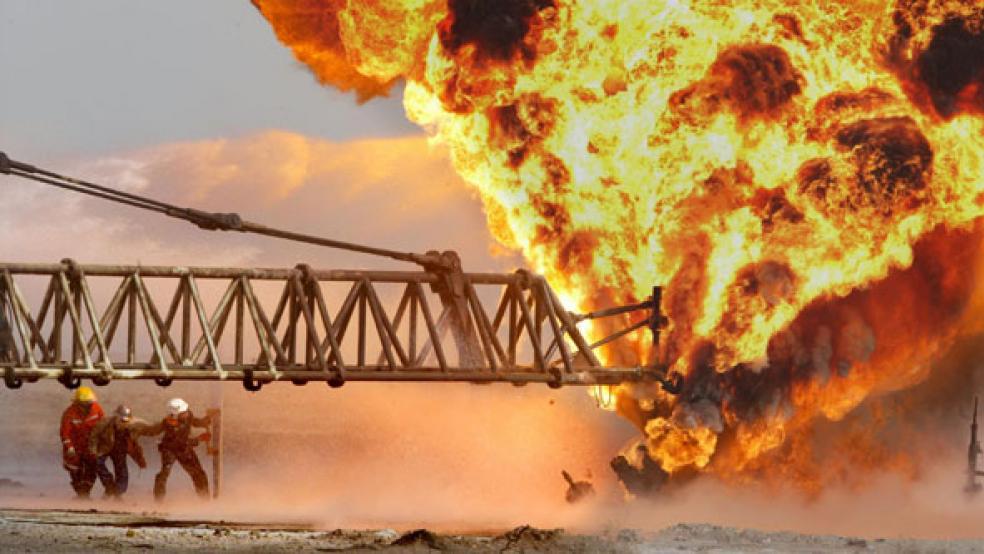The latest spike in gas prices due to heightening tensions in the Middle East is having the expected effect: Consumption is falling. Consumers are taking fewer trips, substituting other ways of getting from here to there, and switching to more fuel efficient vehicles. Gasoline consumption fell 7 percent in the first six weeks of the year compared to the comparable period a year ago.
So far, though, the impact of rising oil and gas prices is the equivalent of the dog that didn’t bark. Economic growth appears to be accelerating despite rising prices. The benchmark price of Brent crude oil soared over $120 per barrel Tuesday, largely in response to fears that the confrontation with Iran will escalate in the weeks ahead.
Oil prices are now at the highest level they’ve been in nine months. Analysts expect the latest run-up, which over the last four weeks has translated into 20-cents-a-gallon hike in the price of gasoline to an average of about $3.58 per gallon nationwide, will continue right through the summer driving season.
Historically, falling demand in response to higher oil prices has signaled the onset of an economic slowdown, or even a recession. But exactly the opposite is happening now. “It’s surprising to see a recovery in the U.S. with demand for gas as low as it is,” said Avery Ash, manager of regulatory affairs for the American Automobile Association. “People are finding ways to save money by making a protracted effort to save on gasoline.”
On the other hand, the other major use of oil – distillates that power diesel trucks and industry – is surging ahead and is now about 15 percent higher than at the trough of the recession. “Distillates are a better barometer of economic growth,” said Neil Gamson, an economist at the Energy Information Agency. “It is picking up as the economy improves.”
Still, the latest run-up will sap the effectiveness of the payroll tax cut extension, which passed Congress last week and will keep wage earners from losing a 2 percentage point boost in the first $110,000 in take home pay. Economists estimated nearly two-thirds of last year’s $115 billion in tax relief went to pay for higher oil prices.
Small Cars, Big Savings
The biggest winners from the latest run-up are automakers around the world. They are seeing a mini-boom in new car purchases as consumers substitute newer, more fuel-efficient cars for older gas guzzlers they couldn’t afford to replace during the Great Recession.
Where consumer preferences aren’t kicking in, the government is helping. President Obama in 2009 raised the fleet average fuel efficiency standard to 27.5 miles per gallon and last year announced it would rise to 54.5 mpg by 2025. Last week 30 senators including two Republicans and one independent wrote Secretary of Transportation Ray LaHood and Environmental Protection Agency Administrator Lisa Jackson endorsing the higher standard, which automakers have embraced by introducing a number of new gas-electric hybrid models and all-electric vehicles.
But oil refiners are big winners, too, and not just from the higher prices. With new sources of domestic oil coming online (domestic production, now at nearly 6 million barrels a day, has increased over 30 percent since 2005 and now accounts for more than 40 percent of all U.S. consumption), exports are surging.
The U.S. now exports 600,000 barrels a day of refined products, up from 200,000 barrels a day last July. “Our refining capacity is so high we’re exporting more finished products than we’re importing,” marveled James Williams, an industry analyst and forecaster at WTRG Economics.
As always when oil prices spike, especially when the price increase is radically at odds with the economic fundamentals (slack demand is supposed to lead to lower prices under classical economic theory), analysts look for other factors that might explain the sudden price moves. Economist Edward Yardeni of Yardeni Research wrote in a note to clients Tuesday that speculators and traders held “long” contracts – in other words, they were betting the price would rise – on a record 43.8 percent of gasoline inventories.
“They must be betting that the confrontation with Iran will worsen, pushing gasoline prices still higher,” he wrote. “They certainly can’t be betting on strong U.S. demand for gasoline. . . Americans are driving less and driving in more fuel efficient vehicles.”
Williams of WTRG said all signs point toward a sudden price decline should there be a de-escalation of tensions with Iran. “Europe is near recession and the U.S. is growing slowly,” he said. “Right now, the price of crude is at odds with the fundamentals.”





